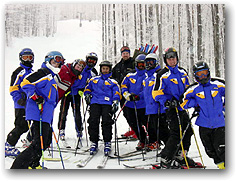
|
|
Racers getting ready to finish practice at Timberline. Photo by Bill Mollard.
|
According to the Timberline/Canaan Race Team coach Mark Fiorini, “The Southeast and Mid-Atlantic region is committed to producing champions. Timberline has racing terrain as good as I’ve seen anywhere. The Mountain has also been very cooperative with the racing program. It’s invaluable.”
Mark speaks from experience. As a former Western Pro B racer, he skied on mountains all over North America and even spent two years in Austria testing his skills on the renowned World Cup course at St. Anton. He also has over 20 years of coaching experience including seven years at the collegiate level.
The Timberline/Canaan team consists of 30 young men and women ages 8 to 18. Fourteen of the racers live in the Canaan Valley area, another nine in greater West Virginia, and seven reside in Maryland or Virginia. These racers attend two-hour practices three nights a week. They also ski in 11 races during the course of the season. The races are run by the Southern Alpine Racing Association. Currently, teams from Bryce, Wintergreen, and Massanutten, in Virginia; Timberline/Canaan in West Virginia; and Sugar and Beech mountain resorts in North Carolina compete in the league. The races are generally held at those mountains.
To join the Timberline/Canaan team, the only requirements are to pay the $200 annual team dues, ski in control on blue slopes, and demonstrate a commitment to improve. Mark has four assistant coaches to help him train his young recruits. Each has at least ten years of teaching experience, and two are level 1 certified U.S. ski coaches. The team’s philosophy is to provide basic ski instruction first and foremost.
“Two-thirds of our roster compete regularly and the rest mainly participate to have fun. Our focus is on fun through skiing and skiing better,” claims Fiorini.
This philosophy, however, can lead to enhanced performance on the course. Fiorini believes that “if coaches continue to focus on perfecting basic skills and movements, the racing takes care of itself. You must learn to ski well before you can race, as you must learn to drive a car well before you can race it. This is the philosophy that has made the Austrians so successful.”
If a member of the Timberline/Canaan team shows exceptional promise, Fiorini encourages him or her to attend a ski academy (such as Burke Mountain Academy in Vermont) to hone their skills.
“To achieve high national rankings,” notes Fiorini, “you have to attend an academy. The facilities, snow-time, level of competition, and coaching are invaluable. We have had several athletes return home from one semester of academy training and the improvement is substantial. People from the Mid-Atlantic and farther south have had good national results and a few have made the U.S. Ski Team.”
All this training and preparation does not come cheap. Tuition, room and board for a full term at Burke Mountain Academy is $23,000. A summer camp is $2,000. Travel, lift tickets, and registration fees push the figures even higher. In fact, the only bargain left in ski racing is the paltry dues charged by programs such as the Timberline/Canaan Race Team for the 40 instructional practices per year.
For most team members, just being on the team and improving their skiing is enough of a reward. For others, downhill dreams are hard to dash. These faithful few endure cold night practices, the endless drives to races, and the ongoing battle with the clock year after year in the hope of moving up one notch in the race world. This year, all the hard paid off for four graduating seniors who won competitive college ski scholarships.
In the end, though, an actor is only as good as his last movie. This past weekend in two races, the Timberline/Canaan Race Team members won 14 medals: 6 bronzes, 2 silvers, and 6 golds. Two members won both the slalom and GS in their age group. For the season, three racers have never placed lower than third in their age class.
So is the next Picabo Street lurking in the lift lines of Timberline? Who knows? The region has produced several national mountain biking champions…
John Sherwood is a columnist for DCSki. When he's not hiking, biking, or skiing, he works as an author of books on military history.

Join the conversation by logging in.
Don't have an account? Create one here.